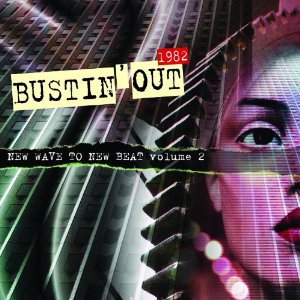On Bustin’ Out 2, Mark Maguire of trance supergroup Juno Reactor commendably refuses to drag his plough across the already deeply-rutted fields of synth pop and post-punk. Instead, by staying true to his own roots in industrial and electronica, he manages to focus on the subversion and innovation of several music movements from the influential 80s underground. This compilation is therefore 100% devoid of shoulder pads, pirate shirts or Ashes to Ashes-style nostalgia; instead, it embraces that which doesn’t lend itself to hypermediation or passive consumption.
Acts like Die Krupps (with the mechanical melodics of ‘Goldfinger’), and East London’s Portion Control (with the anarchic ‘Fiend’) combined the agit-urgency of punk with new synthesisers, maintaining the tension and swagger but executing it in combination with a tight and repetitive drum pattern, to capture and expound a new sound of defiance. Belgium’s Front 242, in borrowing the phrase ‘Electronic Body Music’ from Krafwerk’s Ralf Hutter to describe their ‘No Comment’ EP, unwittingly named this emerging genre. 242’s ‘U-men’, Maguire’s selection here, is far less bombastic than their later work – containing subtle and stripped back constructions to which fans of minimal wave and post-punk should give attention.
But it wasn’t just about aggressive, icy detachment. In the UK of 1982, indignation, subversion and anti-racist sentiment were used as incendiary materials against Thatcherite politics by musicians from London and Bristol, using new technology to create reggae and dub-inspired socially-aware sample pastiche. At the centre of this movement was Adrian Sherwood’s On U-Sound collective. Maguire has appropriately chosen On U-Sound’s Mark Stewart’s bleak paean to urban isolation ‘Liberty City’ to sit alongside Dub Syndicate’s ‘Pounding System’. Together, they represent what was one of the most fertile crossovers in the 80s underground.
Electro is an obvious and much exploited artefact of the 80s, and Maguire has punted to push the electro overground – relatively speaking – in Afrika Baambata’s ‘Planet Rock’, which needs little introduction: this track is to modern electronica what Genesis is to The Bible. Man Parrish’s blueprint jam ‘Hip Hop Be Bop’ has, justifiably, had countless re-releases, and been sampled to bejimminy, and we can discern Chicago house about to unfold a couple of years later in its Kraftwerk-influenced rhythms jacked up to warehouse speed, paired with looped, strung out melodics.
Klein and MBO’s fruity souffle ‘Dirty Talk’ side-nods the Italo-disco producers of the era, who chose moustachioed disco-don Moroder as their touchstone, and spliced in the new rhythms of electro to manufacture a sickly sweet confection, popular throughout the 80s in nightclubs, aerobics classes and the Eurovision song contest. Perhaps its greatest virtue is ‘Dirty Talk’s alleged effect on New Order, who were apparently so inspired that they penned their little known early A-side ‘Blue Monday’.
The indulgent ambient/tribal of ‘Dans Les Jardins’ from Tuxedo Moon’s Steve Brown and Benjamin Lew, and 4AD funk pop collage-ists Colourbox’s somewhat limp ‘Breakdown’ are compilation lowpoints. Maguire has balanced them out, blessedly, with post-Industrial sonic highlights in Chris and Cosey’s ‘Impulse’ and Pylon’s ‘Four Minutes’.
Chris and Cosey emerged from Throbbing Gristle with taste for sonic subversion, and ‘Impulse’ is an attention-keeping urban dreamscape where Kraftwerkian bleeps collide with shadowy doppler-sighs. Recent hipster-reframes Pylon contribute the astoundingly tense and spacious sonic collage of ‘Four Minutes’, mixing Cab Voltaire-style sampling with a Lynchian/Badalamenti style lascivious menace.
Maguire gives a concilliatory nod to the UK pop-funk sound, which, for all its painfully bland flaws (Level 42, Paul Young), also embraced innovators like Shriekback, whose early work is still criminally undersung. ‘My Spine (Is The Bassline)’ is a percussion and bass-driven loose-hipped creeper, managing to mix menace and a semi-load of sex. Gary Numan’s ‘Music For Chameleons’ from the I, Assassin album tapped into this funk fusion – a mid-career move which his fans often savagely scorn. The slap and slide sound of Pino Palladino’s fretless bass covers ‘Music for Chameleons’ like police tape at a crime scene, making a surprisingly palatable sonic melange with the trademark Numan metallic synth wash..
In a league of its own on this compilation is ESG, who were to the 80s what !!! are to the 21st century. ‘Moody (Cut Down version)’ is an edit version of one of the band’s most revered and remixed tracks, first appearing on their Dance to the Beat of the Moody EP in 1982. Replete with enticing bass and percussion driven minimalism, ‘Moody’ was a blueprint for house, techno and the art-disco revival of today.
Although any afficionado will no doubt have their own signposts and preferred nexus points, this collection serves us well as sonic mapping of the subculture of 1982. Maguire can confidently expect to evoke increased curiousity, and respect, for thoughtfully exploring the music of the period without resorting to the distorting, lurid gaze of kitsch-centric nostalgia.


